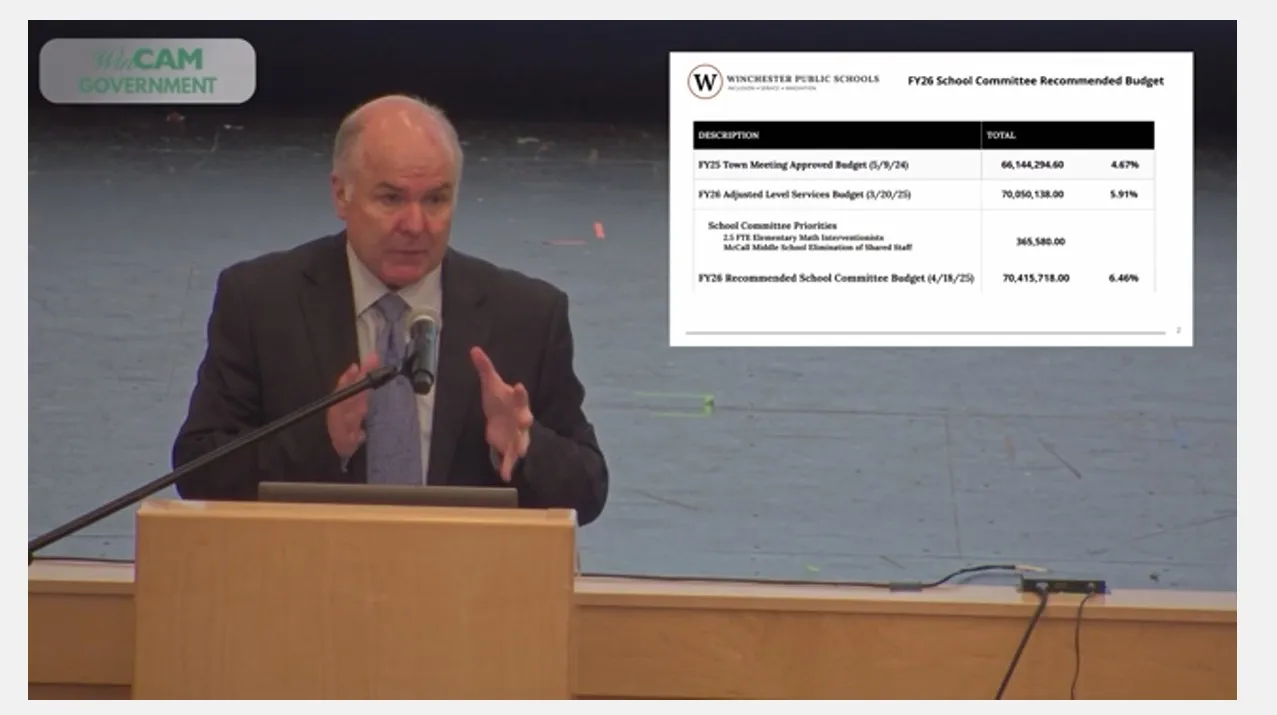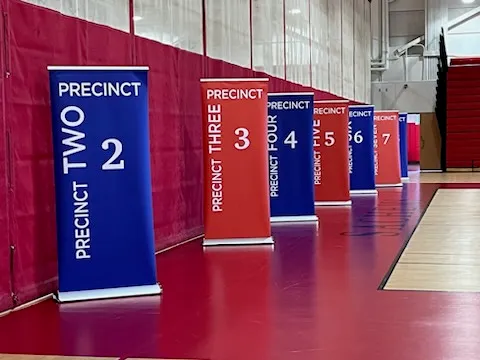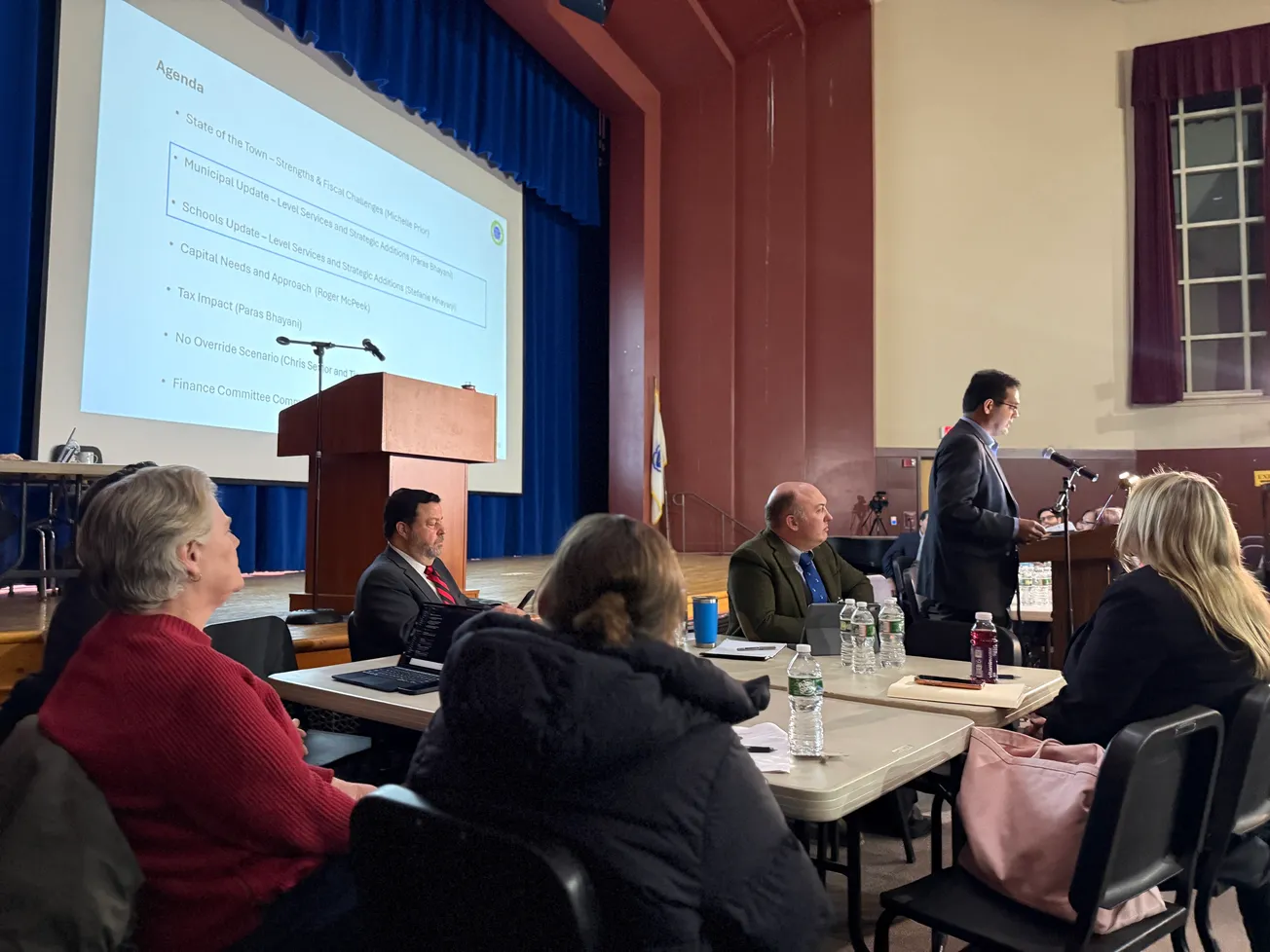Table of Contents
As expected, Town Meeting took up the fiscal year 2026 budget at its third session on Monday evening, with debate heavily centered on the school budget.
The School Committee in late March voted 4-1 to increase the district’s level service budget by 7%, bringing the new FY26 budget to upwards of $70.4 million.
During the May 5 meeting, Superintendent Dr. Frank Hackett said the budget covers the usual operating expenses with the addition of funds for math intervention specialists, two full-time employees to address the upcoming McCall Middle School schedule implementation, data management systems, literacy specialists and professional development.
The superintendent then addressed suggestions the School Department depends on the state Circuit Breaker Program to help fund rising Special Education costs.
Hackett explained the formula for the Commonwealth Special Education Reimbursement Program, commonly known as the Circuit Breaker Program, addresses per pupil costs by providing “financial assistance to public school districts to offset the cost of delivering high-cost special education services to students,” according to the state’s website.
Hackett called the process “complicated” due to its many variables, including reimbursement percentages. Hackett said cities and towns are reimbursed in October after the passage of the state budget, but the percentage sent back to communities is never a set number. For example, last year the number was 75%, but it has been as low as 42%, added one Town Meeting member.
Luckily, Hackett said Winchester smartly builds its budget in arrears, meaning it works off the past year’s Circuit Breaker reimbursement. That way, he added, the town isn’t dependent on the uncertain repayment.
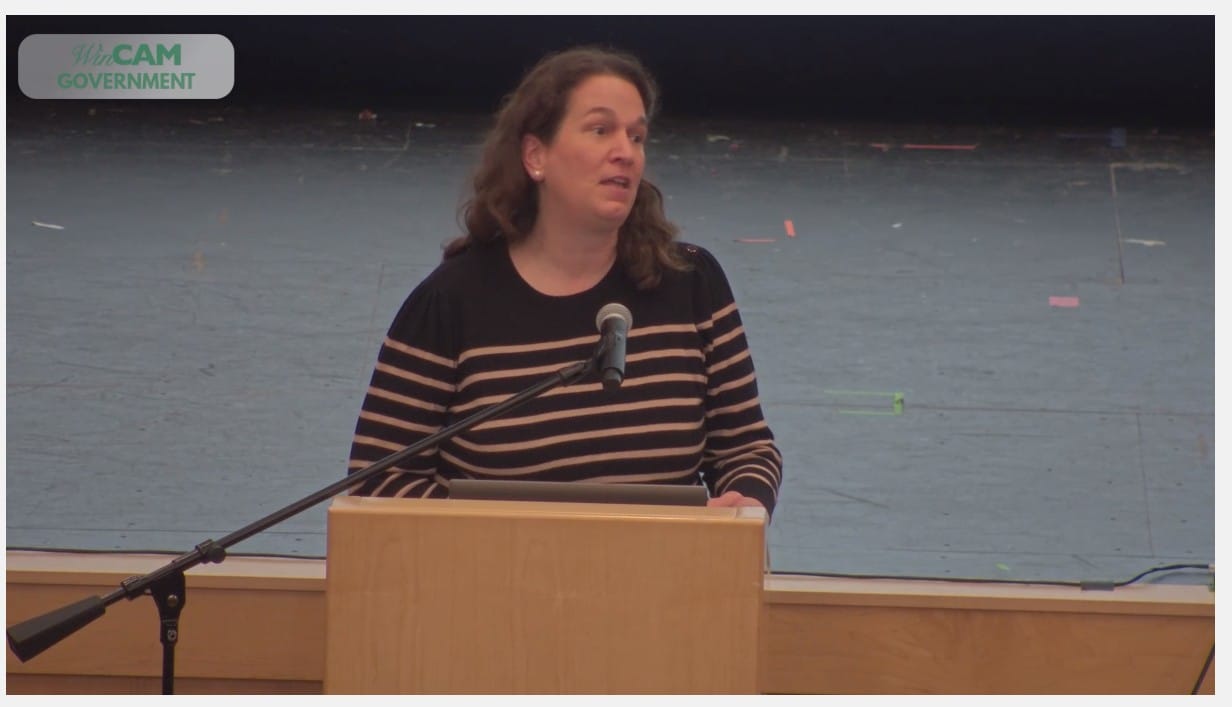
Shannon Stott, president of the town’s special education advisory group, WinPAC, also spoke during the evening, urging Town Meeting to not use the Circuit Breaker Program as a way to fund the school budget.
“WinPAC is opposed to the use of 100% of the Circuit Breaker,” Stott said. “I would support the full budget, but without the Circuit Breaker.”
Finance Committee Chair Jeff Calabrese said the idea was never to use the entire $2.4 million from the Circuit Breaker Program, but only 50% of that sum. He added this was just one suggestion for a solution to the budget presented by the School Committee.
“We’ve been the only committee to propose solutions throughout this entire process,” Calabrese said, of the budget.
Hackett, however, said using a suggested $1.7 million of the Circuit Breaker funds to fill the School Department’s proposed budget gap would then create another deficit going into fiscal year 2027.
“If Town Meeting votes the FinCom budget, there will have to be an emergency School Committee meeting on how to cover the deficit,” Hackett said. “I would have to recommend reductions for the following year.”
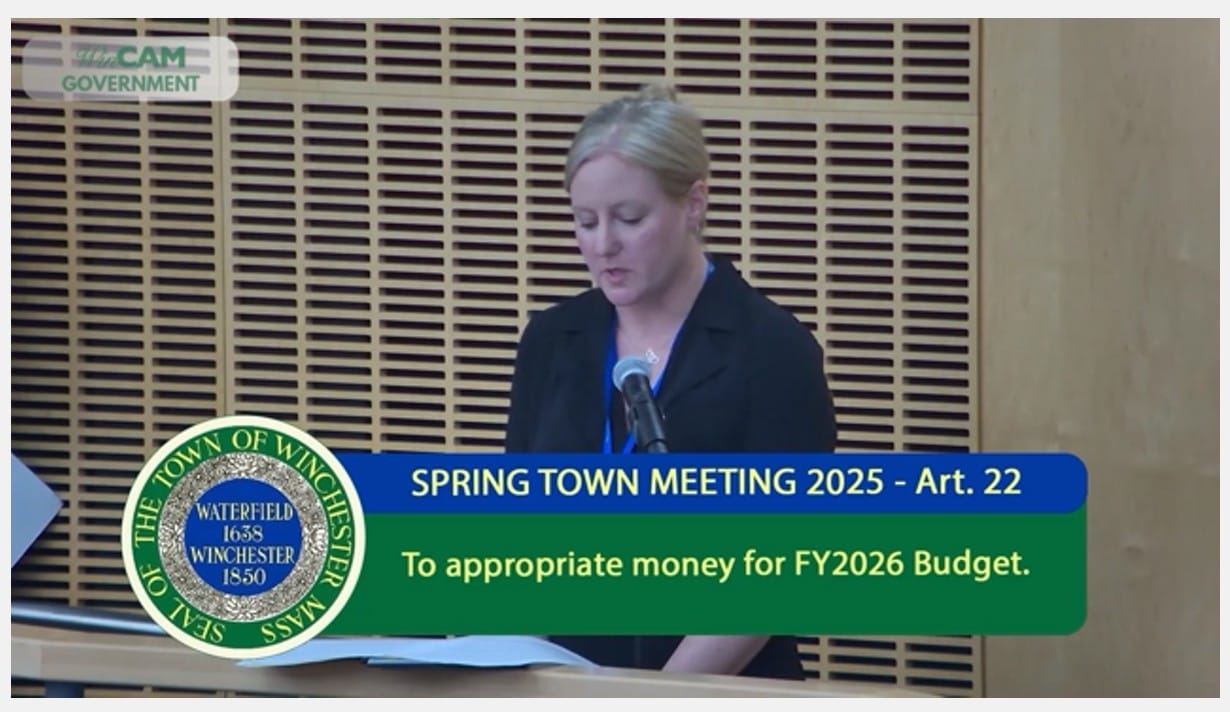
When Precinct 8 member Heather von Mering took to the floor, she quickly stated she was not a big fan of the School Department. She further said she was highly disappointed in the ongoing literacy issue, but added she was impressed with Hackett after speaking with him on the issue and receiving an apology.
Von Mering said that apology and the district’s recent work in trying to get itself back on track by coming up with a five-year plan motivated her to do deep dives into the Circuit Breaker Program and the town’s free cash, as well as undertaking a line-by-line analysis of the school budget.
Her conclusions?
“I do not support the district using the Circuit Breaker for the FY26 budget,” von Mering said. “I believe the best way forward is for Town Meeting to fund the school budget as requested.”
Von Mering then made an amendment to change the original motion to the School Committee recommendation of $70,415,718 with an additional $1.7 million in free cash to offset the deficit.
The former town moderator further asked the Select Board to come up with a financial plan that would continue to support the town’s schools.
The back and forth
Should they vote the amendment? Should they forgo the amendment and just approve the original motion put forth by FinCom?
Many members of Town Meeting came forward to speak on the amendment, many putting forward their thoughts on one or the other.
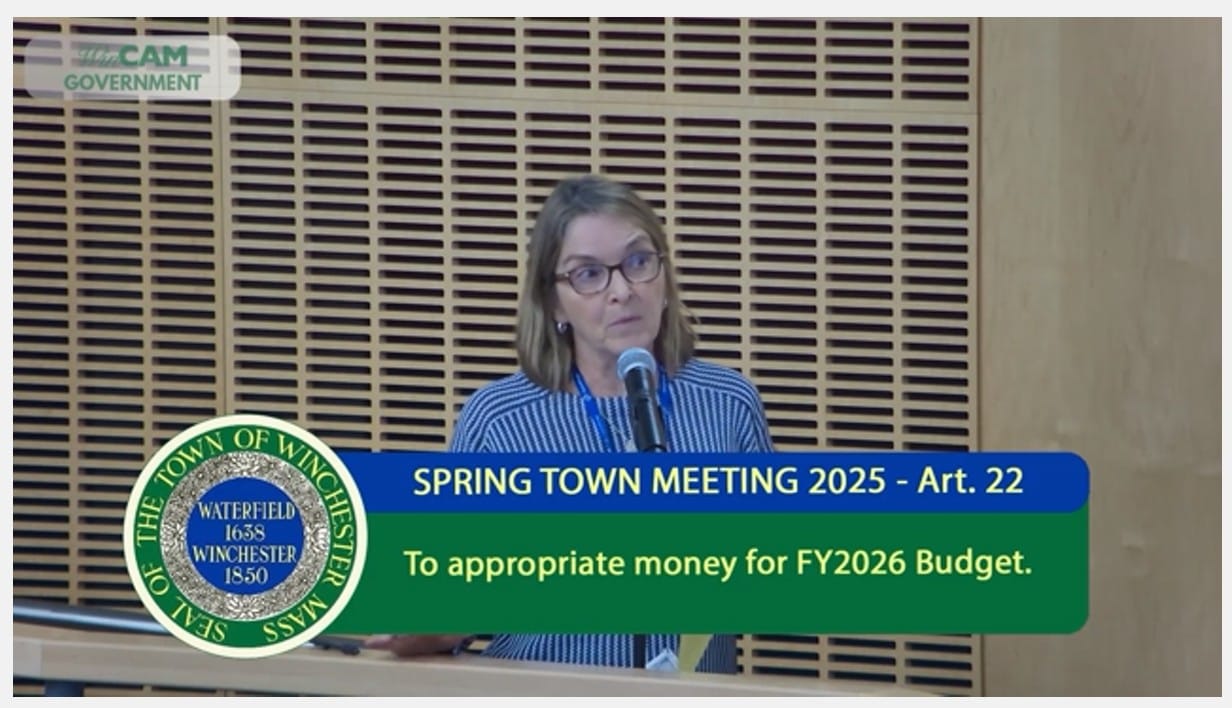
Carol Savage, of Precinct 5, said she didn’t agree with von Mering’s amendment purely based on the uncertainty of what’s going on in Washington D.C. She acknowledged the town’s need to pass an override next year, given the financial issues facing the community.
“We need to pass a serious override,” she said. “What we do will send a serious message to the community on how we spend their tax dollars.”
Maura Sullivan, of Precinct 1, said the vote really came down to whether you wanted to support the FinCom recommendation to raise the school budget by only 3.87% or the School Committee’s budget, with its 6.46% increase. She urged Town Meeting to “think carefully” before voting.
Taylor Tinmouth, of Precinct 6, spoke in support of the amendment and said she couldn’t help but feel confused by the arguments being made to avoid the use of free cash unless there was an emergency, especially if Town Meeting members looked at the issues surrounding literacy.
She said there was a 111-page report delivered last spring, stating 39% of parents are paying for tutors for their children, teachers are paying for supplies and furniture out of their own pockets and the town is in the bottom 1/5 of per pupil spending in the state when compared to peer communities. She said there is no need to wait, as the emergency is now.
“Why is it a point of pride that we do so much with so little, but it’s still less than our peer communities?” Tinmouth asked, adding she’d like Town Meeting to have a chance to hear to know why the Select Board voted 4-1 in favor of the amendment.
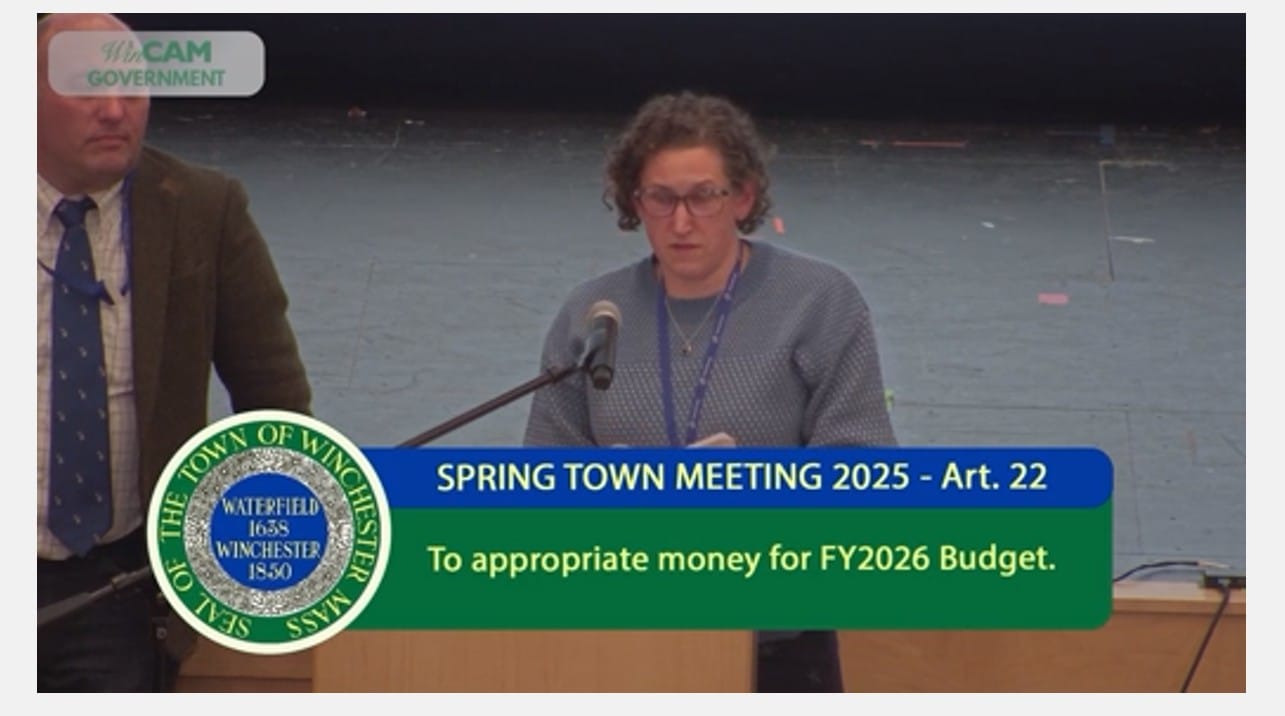
Select Board members Anthea Brady and Bill McGonigle both spoke. Brady said it’s obvious the schools need help with math, that the McCall schedule needs to come into compliance with the rest of the district and that it’s time for the town to make an investment now.
“This town is pennywise and pound foolish,” McGonigle said. “We have issues with math now, like we had issues with literacy five years ago. We need to be smart and spend on the problems we have now. It won’t save time and money down the road. I can guarantee it will probably cost us more.”
The votes
Despite many members speaking against von Mering’s amendment, Town Meeting voted 102 in the affirmative against 60 negative votes and two abstentions.
There were a number of cheers, but it wasn’t certain if it was Town Meeting members or a number of teachers or students who gathered in the rear of Winchester High School’s auditorium where the meeting was held.
Town Moderator Philip Frattaroli then went to the original motion, now amended.
Caren Connelly, of Precinct 3, spoke before the main motion vote, saying she didn’t want anyone to feel bad about using free cash. She added there was a time when Winchester couldn’t afford to fully fund its schools and because of that, the schools lost all their librarians.
“It took eight years to get them all back,” Connelly said. “There was also a time when the schools came to [Winchester Foundation for Educational Excellence (WFEE)] and asked us to find a way to privately raise money to pay teacher salaries. We did that for two years.”
And then there was $800,000 raised for technology, which the schools once again asked WFEE to help out with.
“Spending money on our schools is our best investment,” Connelly said. “It’s why people move here.”
She added it was time to let this money be “a bridge” and then come up with a plan to move forward.
On a voice vote, Town Meeting agreed and passed the education portion of the budget.
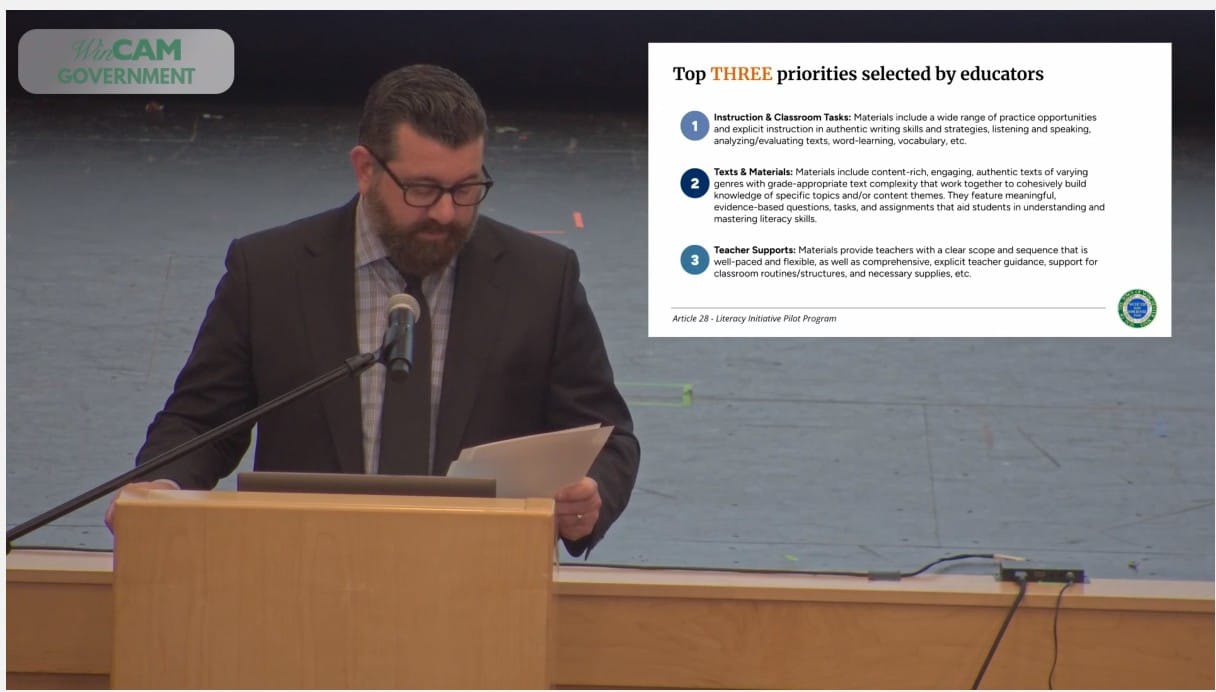
Literacy pilot program
Article 28, put in by Select Board member Michael Bettencourt, also drew some debate. The article asked for Town Meeting to approve $455,000 from free cash to support the literacy initiative pilot program for the 2025-26 school year.
Bettencourt said this was a one-time expense to allow the School Department to “support training in evidence based reading instruction including, but not limited to, language comprehension and word recognition, or take any other action in relation thereto.”
Bettencourt said he expected Hackett and the State of the Town Committee would be back before Town Meeting in spring 2026 to report on which literacy program the district expected to use and return any unused funds from the pilot.
Bettencourt added his reason for pulling the literacy initiative out of the School Department budget was based solely on making sure it was passed.
“We’ve heard a lot about literacy over the past several years,” he said. “I know there’s a lot of financial pressure on the town, but I felt we couldn’t wait any longer.”
He added many parents have seen their children start school and are now in middle school, with little movement on a new literacy program.
“It felt too important to be cut out of the school budget,” Bettencourt said, adding so many parents have worked so hard to move this issue forward.
Many Town Meeting members said they wholeheartedly supported the literacy program, but they also had questions about what the money would be used for. Precinct 6 member Dorothy Simboli also wanted to know how the School Department intended to measure success after the pilot program was over.
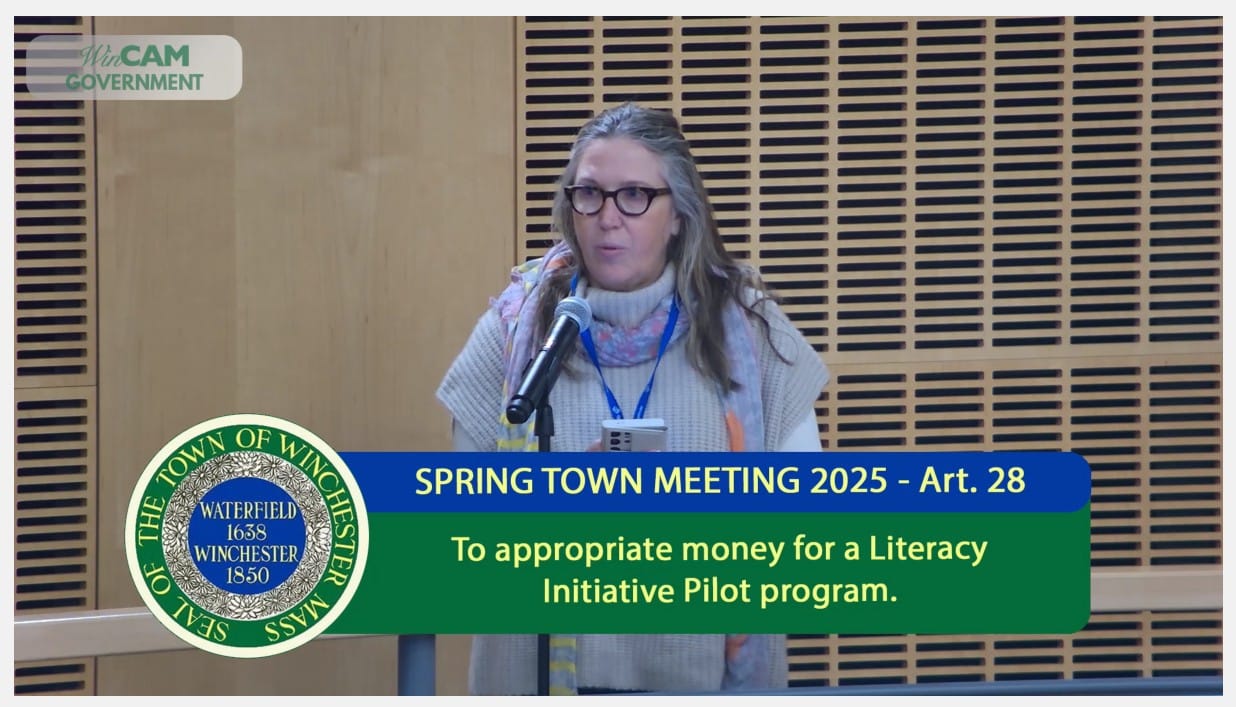
Hackett said the idea is to provide software to manage the large amount of data the schools receive from testing and assessments. That information would then be used for recommendations for support in the classroom and at home.
He added there would be a clear process to further assess if students were progressing.
Hackett said the School Department will have a better idea in January 2026 about which option it will move forward with, based on the cost and being able to provide support to staff via ongoing professional development.
Brian McCarthy, of Precinct 4, asked who will oversee this block of free cash, making sure the School Department uses it only for the literacy pilot.
Comptroller Stacie Ward said a special account was created for the literacy program, making sure funds are used only for this purpose.
Despite questions and some very minor concerns, Town Meeting voted overwhelmingly to support the program on a voice vote.
Town Meeting is expected to meet in its final session on Thursday, May 8 at Winchester High School auditorium, beginning at 6:30 p.m.

